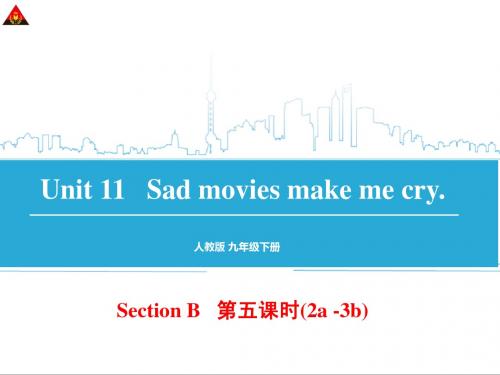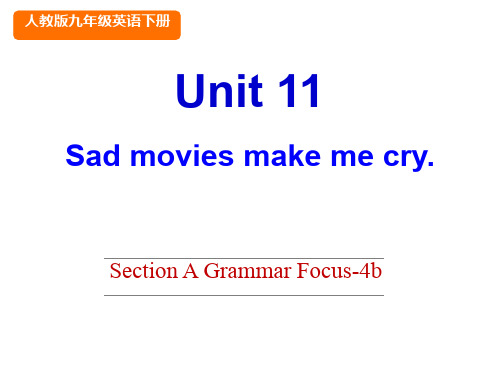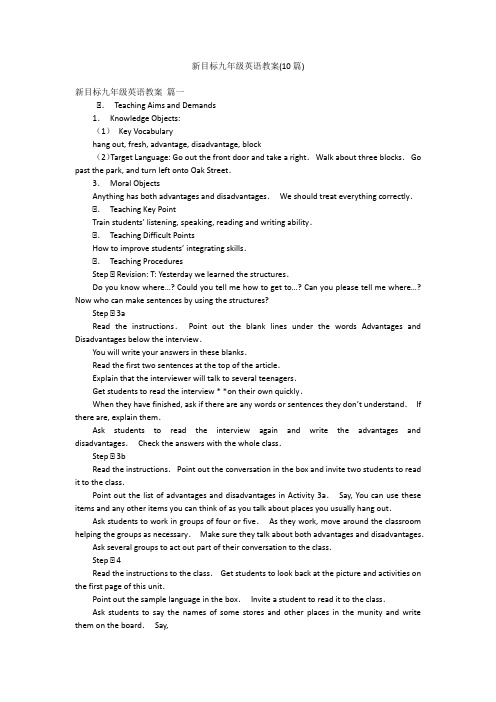新目标英语九年级unit 11 教案
英语人教新目标九年级全一册(2014年新编)Unit 11 Sad movies make me cay Section B 教案

Unit 11 Sad movies make me cay第四课时 Section B(1a ~ 1e)I. 知识目标重点词组1. remain unhappy forever仍旧永远不幸福2. a shirt of a happy person一件快乐人的衬衫3. search for搜寻,寻找4. return to the king回复国王重点句式1. The general finds a happy person with power and money.将军找到了一位既有权又有钱的快乐人。
2. The general realizes he is a happy person and gives his shirt to the king to wear.将军意识到他就是一个快乐的人并把他的衬衫脱下给国王穿。
3. What made the poor man so happy even though he had no power, money or fame?是什么使这位穷人即使没权,没钱也没名誉还如此高兴?4. Do you agree with the poor man’s thoughts about happiness?你同意那位穷人关于快乐的想法吗?II. 课堂环节§自主学习方案【新词自查】根据句意首字母提示提示完成单词。
1. I don’t like that movie because the sad movie makes me unhappy.2. All the police were sent to search for the three lost children.3. The woman was too poor and she was always worried about the food for her children.4. I have been out for three weeks and I have to return back home tomorrow.5. They invented a plane which can get power from the sun and keep on flying around the world.§课堂导学方案Step 1情景导入同学们还记得在第二课时一个国王派人寻找快乐人的衬衫的故事吗?国王最后找到了快乐的人吗?故事的结果是怎样的呢?你们能猜一猜吗(3分钟)1. Do you remember the story we learned in the period two?__________________________________________2. Had the king found the happy man?________________________________________3. Do you want to know the ending of the story?________________________________________4. Can you guess the ending of the story?_________________________________________Step 2完成教材1a-1e的任务1. 要求学生翻开课本P85,迅速阅读1a部分所给的有关国王的故事的结局的几种猜测。
最新人教新目标九年级英语全册 Unit 11 Sad movies make me cry(第2课时)教案

Unit 11 Sad movies make me cry(第2课时)一、教材分析:本课时主要是语法讲解与练习,将动词make的用法;并完成相应的练习4a与4b来巩固所学的语法知识.二、三维目标:1. 语言目标:能够对所给的句子找出make的具体用法;2. 能力目标:能够运用所学的动词make的各种结构;完成相应的练习题;3. 情感目标:能够让学生理解事情对他们产生的影响。
三、教学重点与教学难点make sb + infinitive;make sb + adjective;四、教学策略本课时主要是一节语法讲解课与随堂练习,根据《英语课程标准》及《英语教学大纲》的要求,在本节课的教学过程中,采用“小组合作“以及“任务型”的教学途径,借助多媒体,增强趣味性和直观性,增大课堂容量,提高课堂效率,面向全体同学,帮助学生掌握知识、发展能力、形成正确的价值观。
五、教学准备:课件、多媒体设施、录音机、学生分组;六、教学环节:一)Review:1.---I’d rather go to Blue Ocean because I like to listen to quiet music whileI’m eating.---But that music makes me sleepy.2. Waiting for Amy made Tina crazy.3. The movie was so sad that it made Tina and Amy cry.4. Sad movies don’t make John cry. They just make him want to leave quickly.二) Learn the Grammar Focus.先让同学们自己来读所给的这几个英语句子,然后找出两名同学读给全班同学听;接着老师试着让几个同学说出每个句子中的make的结构.The teacher explain:1.The loud music makes me nervous.此句是make sb adj 的结构,即:make +某人+形容词;2.Soft and quiet music makes me relax.此句是make sb do 的结构,即:make +某人+动词原形;3.Money and fame don’t always make people happy.此句是make sb adj的结构,即:make +某人+形容词;4.She said that the sad movie made her cry.此句是make sb do 的结构,即:make +某人+动词原形;总结:make 的结构为:make + 某人(人称代词的宾格) + 形容词/动词原形;三)完成练习:4aThink of appropriate words for the blanks. Then compare your choices with your partner.For this part, ask the students to try to complete it by themselves. And then ask twostudents to say her or his answers to the whole class, and the other students can give her or his opinion about the diary. The answers are not only.四)小组活动.(4b)Complete the survey. Then ask two other students.We can use the following words or phrases:happy, want to cry, uncomfortable, angry, nervous, feel like dancing;You can begin like this:A: What makes you angry?B: When people throw rubbish on the streets, it makes me angry.A: Me, too. It makes me want to tell them to clean up the streets.Ask the students to practice the dialogue in his or her group, in order to grasp “make sb adj, make sb do”. Give the students about five minutes, and then ask two groups to act it out in the front of the class. And the teacher should say: OK or GOOD, in order to encourage more students to be active in English class.七、家庭作业:Read and write the sentences in the Grammar Focus.八、板书设计:Unit 11 Sad movies make me cry.1.The loud music makes me nervous.2.Soft and quiet music makes me relax.3.Money and fame don’t always make people happy.4.She said that the sad movie made her cry.九、教学反思:通过本课时的讲解与练习,同学们对make +某人+ 形容词与make + 某人 + 动词原形的结构得到了巩固,掌握的较好.。
陕西省石泉县池河中学九年级英语全册unit1(11)教案(新版)人教新目标版

一、
教材
分析
活动1a-1e是围绕英语学习的听说任务链活动.1a-1b让学生思考自己英语学习有哪些困难 ,并写出来 .1a列举的学习困难也为后面1c-1d的听力谈论的相关话题进行了预热 .1e需要结合所听内容 ,用对话形式复现听力信息 .
二、
4. He should find a ________ to practice writing.
七、
作业
设计
What things are difficult to learn Englissh.Write eight sentences at least.
三、
教学
目标
技能目标:
1.熟练掌握以下词汇:pronounce increase speed pBiblioteka rtner2掌握所涉重点句子
3.完成课本各听力题目 .
情感目标:
鼓励学生直面学习困难 ,积极探索解决方案 ,不断改进自己的学习方法、提高学习效率 .重点、难点 (Key points and difficulties )
____I can'talwaysunderstand spoken English.
____I don't know how to increase my reading speed.
____I can't spell some English words.
____Ioftenmake mistakes in grammar.
学情
分析
本局部在SectionA谈论英语学习的根底上 ,在话题上从英语的学习困难及解决方案 ,拓展到优秀学习者的学习习惯;在语言上稳固了Section A所学语言结构 ,丰富了与学习相关的话题词汇;在技能上将听说能力综合 ,突出阅读训练 ,由读促写;在策略上 ,引导学生关注优秀学生的学习方式 ,借鉴并用于自身;在情感上 ,鼓励学生直面学习困难 ,积极探索解决方案 ,不断改进自己的学习方法、提高学习效率 .
人教新目标九年级英语 Unit11 教材解读

人教新目标九年级英语 Unit11 教材解读Unit11 教材解读1.0Textbook Analysis教材解读本单元以“情感(Feelings)”为话题,就生活的各个方面,谈论事物对情感的影响,学会倾诉烦恼以及寻找合适的解决办法。
Section A第一部分以周围的环境,事物,朋友关系为主要内容,要求学生运用已学过的与情感相关的词汇来表达自己的感受;第二部分以寓言故事第一章节的形式引出问题“有权力,财富和荣誉就能快乐吗?”让学生思考,和学生共同探讨和反思“究竟怎样才能获得真正的快乐”。
在语法方面,让学生巩固并熟练运用表达情绪和感受的形容词和动词,结合make sb. do sth. 和make sb. +adj. 结构来表达个人的情绪等相关内容。
在话题上,Section B第一部分延伸了寓言故事的发展和结局。
通过预测,听力和讨论,引导学生建立正确的人生观;第二部分回归生活,从学生遇到问题到解决,延伸到建立积极的情感态度。
在语言上,进一步丰富与学习相关的话题词汇。
在技能上,将听说能力综合,让学生了解习语(idioms)和短语(phrases)在英语学习中的重要性,由读促写。
在教学策略上,要引导学生善于分享生活中快乐和难过的经历,总结经验教训以及寻求适合的解决办法。
1.1S ection A 1a 活动1a是Lead-in部分。
引导学生谈论两家餐馆的环境,通过不同环境给人的不同感受及其理由分析呈现sth. make sb.+adj.的句子结构以及巩固与情感相关的词汇使用,激活学生表达相关感受的语言,为1b的听力练习和1c的口语对话操练作好语言和话题的铺垫。
1.2S ection A 1b-1c 活动1b-1c是Listening and speaking的部分。
在1a的Free-talk基础上直接过渡到听力练习,强化用于描述事物和表达情感的形容词的使用,熟悉役动词make表达情感的基本结构。
听后让学生以两人一组的对话形式谈论各自对两家餐馆的看法和理由。
新目标人教版九年级英语《unit11Sad movies make me cry》Section A(1a-2d)课件

Blue Ocean
Which restaurant would Amy rather go to? Why?
Amy would rather go to Blue Ocean because..
1c. Role – play a conversation between Amy and Tina.
Amy
Tina
Tina and Amy spent a night together. First…
2d
Nancy
Nancy has made Alice mad.
Alice BertJul来自eHomework 2d
Write a short passage according to 2d.
stay at Amy didn’t want to _____ Rockin’ restaurant.
makes John Loud music ______ want ____ to ______. dance _______
The movie was so sad that it_______ made Tina and Amy ____ cry
微课学习检测
1.使某人生气/困倦 2.使某人想跳舞 3.使某人发疯 4.越...就越... 5.我们有很多共同之处 6.成为某人的朋友 7.被冷落 8.宁愿做/不做某事 9.让我们的友谊更牢固
make sb. mad/sleepy make sb. want to dance drive sb. crazy the+比较级,the +比较级
Amy and Tina want to have dinner. They are trying to decide which restaurant to go to.
2014年新目标九年级英语Unit11(第五课时)实用课件

4.You should learn to relax and not put so much pressure on yourself.
be too hard on yourself 5.The teacher told the students to work hard together and not give up. pull together
3.Do you agree with Peter’s father? Why or why not?
Yes. Because soccer is about team effort. Players should support each other while palying, and they should well communicate with each other and learn from their mistakes, then the team would be the winning team.
· winning/losing a competition
· getting good/bad grades on an exam
· performing something well/badly in front of a big
group of people · getting into a fight with your best friend · your first trip outside your hometown
嗯, 我真的必须走了, 我在此待得够久了。
1. He went to the zoo _____ B stayed at home to learn English. A. instead of B. rather than C. than B his 2. He failed the exam. He _____ parents. A. makes, down B. let, down C. looked, down
新目标人教版英语初三全册Unit 11 Sad movie make me cry Section A Grammar Focus-4b课件

B
11. Danny did all kinds of things to make the baby ____ .
— It _____ people _____ good.
A. makes; looks B. makes; look
C. make; looks D. make; look
8. —What do you want to do with the pollution?
—It makes me __C___ a clean-up campaign.
It was a grey, wet, April Sunday. 那是一个阴沉、潮湿、四月里的星期天。
Complete the survey. Then ask two
4b other students.
What makes Yo Student Student
you ...?
u1
2
happy
want to cry
cloudy days make me ________. And this
was the day we would getsaoudr exam results
back, but I didn’t answer the exam questions
very well last week. That made me _n_e_r_v_o_u_s__. I walked to school with my best friend Holly. She
3. The sports meet will continue _D__ it rains this afternoon.
A. if
B. since
新目标九年级英语教案(10篇)

新目标九年级英语教案(10篇)新目标九年级英语教案篇一Ⅰ.Teaching Aims and Demands1.Knowledge Objects:(1)Key Vocabularyhang out, fresh, advantage, disadvantage, block(2)Target Language: Go out the front door and take a right.Walk about three blocks.Go past the park, and turn left onto Oak Street.3.Moral ObjectsAnything has both advantages and disadvantages.We should treat everything correctly.Ⅰ.Teaching Key PointTrain students’ listening, speaking, reading and writing ability.Ⅰ.Teaching Difficult PointsHow to improve students’ integrating skills.Ⅰ.Teaching ProceduresStep Ⅰ Revision: T: Yesterday we learned the structures.Do you know where…? Could you tell me how to get to…? Can you please tell me where…? Now who can make sentences by using the structures?Step Ⅰ 3aRead the instructions.Point out the blank lines under the words Advantages and Disadvantages below the interview.You will write your answers in these blanks.Read the first two sentences at the top of the article.Explain that the interviewer will talk to several teenagers.Get students to read the interview * *on their own quickly.When they have finished, ask if there are any words or sentences they don’t understand.If there are, explain them.Ask students to read the interview again and write the advantages and disadvantages.Check the answers with the whole class.Step Ⅰ 3bRead the instructions.Point out the conversation in the box and invite two students to read it to the class.Point out the list of advantages and disadvantages in Activity 3a.Say, You can use these items and any other items you can think of as you talk about places you usually hang out.Ask students to work in groups of four or five.As they work, move around the classroom helping the groups as necessary.Make sure they talk about both advantages and disadvantages.Ask several groups to act out part of their conversation to the class.Step Ⅰ 4Read the instructions to the class.Get students to look back at the picture and activities on the first page of this unit.Point out the sample language in the box.Invite a student to read it to the class.Ask students to say the names of some stores and other places in the munity and write them on the board.Say,Each group can choose three of these places to write about, or you can choose another place you know ofWrite careful directions from the school to each place, but do not say the name of the place.You can use the words this place instead.In order to help students work, draw a simple map showing the school and several nearby streets.When the groups are ready, they read their directions to the class and the other students guess the name of the place they are talking about.Step Ⅰ Homework1.Ask students to choose two places in the munity and write careful directions from the school to each place.2.Finish off the exercises on pages 46~47 of the workbook.新目标九年级英语教案篇二Paragraph 1When you visit a foreign country, it is important to know how to ask for help politely (adv. 礼貌地)….Paragraph 2Good speakers change the way they speak in different situations. …Paragraph 3Usually polite questions are longer. They include expressions such as “Could you please …?” or “May I ask …?”Paragraph 4However, it is important to learn how to use the right language in different situations. …2) Read the article again and answer the questions.Read paragraph 1 and answer the question.What else do we need to learn besides asking a question correctly when you ask for help?We need to learn how to be polite when we ask for help.Read paragraph 2 and answer the question.What do we need to think about when you talk to different people?We need to think about whom we speak to or how well we know them.Read paragraph 3 and answer the question.What can lead in to a request with a stranger on the street?“Excuse me, I wonder if you can help me” or “I’m sorry to trouble you, but …” before asking for help.2c Find all the direct questions and polite requests from the passage.Direct questions Polite requests1. 1. Where are the restrooms?2. When is the school trip?3. Peter, tell me your e-mail address.4. Where’s the post office?1. Could you tell me where the restrooms are?2. Excuse me, Mr. West.Do you know whenthe school trip is?3. Peter, could youplease tell meyour e-mail address?4. Pardon me, could you please tell me where to park my car?2d Read the requests below. In the second column, write A if you would say it to someone you know and B if you would say it to a stranger. In the last column, write where you think these people are.Request Person Place1. Will you pass the salt? A home2. Do you know where I can change some money, please? B street3. Could you tell me what just happened? A/B any public place/home4. Can you please tell me where the nearest station is? B street5. Excuse me, do you know what time it begins, please? B movie theater6. Let me know when you’re ready, OK? A home7. Could you possibly tell me the way to the village school? B streetStep 9 Language points1. Both are correct, but the first one sounds less polite.less + 形容词或副词,构成降级比较形式,相当于中文“不那么;稍许不……”之意。
- 1、下载文档前请自行甄别文档内容的完整性,平台不提供额外的编辑、内容补充、找答案等附加服务。
- 2、"仅部分预览"的文档,不可在线预览部分如存在完整性等问题,可反馈申请退款(可完整预览的文档不适用该条件!)。
- 3、如文档侵犯您的权益,请联系客服反馈,我们会尽快为您处理(人工客服工作时间:9:00-18:30)。
一、直击课标要求 1.语言目标 Ask for information politely. 2.重点词汇 restroom drugstore main escalator furniture exchange hang fresh slide clown adventure wrap hero monkey king journey brave trick demon period AD battle powerful political force foreign beauty heart hunter slam dunk crime imagination plain creativity look department store furniture store hang out water slide dress up no longer Monkey King The Three Kingdoms 3.关键句型 Could you please tell me where the restrooms are? Can you please tell me where I can get a dictionary? Take the elevator to the second floor. Turn left. The drugstore is between the furniture store and the bookstore. Go past the bank. Do you know where I can exchange money? The bank is next to the bookstore. Could you tell me how to get to the post office? Parents will spend many happy hours walking through the History Museum. I've been collecting them for many years. 4.语法 问路和指路 祈使句 二、课前学习提示 (一)词汇 1.exchange [iks't.eind/] vt.交换,交流,交易,兑换;作不及物动词用表示“调换岗位”;它还可作名词用。 【例】 (1)The two girls exchanged seats. 这两个女生调换了座位。 (2)Again she exchanged words with her neighbour. 她又同邻居吵架了。 (3)They exchanged U.S.dollars for Francs. 他们把美元换成了法郎。 (4)Lucy exchanged from Class Three into Class Two. 露西从三班调到了二班。 (5)We had a frank exchange of views. 我们坦率地交换了意见。 (6)She gave him a valuable stamp and received a song book in exchange. 她给他一张珍贵的邮票,换来一本歌曲集。 2.hang[h#0] vt.& vi.悬挂,垂下,徘徊,悬而不决,它的过去式、过去分词是hung,hung或hanged,hanged。hang不可作“吊死,绞死”用,其过去式和过去分词是hanged,hanged。另外hang可作名词用,表示“要点,诀窍”。 【例】 (1)She hung her husband's portrait on the wall. 她把丈夫的肖像挂在墙上。 (2)The window was hung with green curtains. 窗上挂着绿色窗帘。 (3)Long tassels hung down to the floor. 长长的缨子垂到地面。 (4)The decision is still hanging. 尚未做出决定。 (5)The man was hanged in 1947. 那人一九四七年被绞死了。 (6)He believes he's got the hang of driving. 他自信已领会了开车的要领。 (7)I don't get the hang of his remarks. 我不明白他讲话的要点。 3.fresh [fre.] adj.新鲜的,新的,无经验的,清新的,精神饱满的等。 【例】 (1)He doesn't want to speak as he is still fresh here. 他新到这里,所以不想发言。 (2)The brilliant performance are still fresh in people's memory. 那次精彩的演出人们记忆犹新。 (3)I prefer fresh pork to bacon. 我宁愿吃鲜猪肉,不愿吃腊肉。 (4)She is a fresh hand at the job. 她做这项工作还是新手。 (5)Open the window and let in some fresh air. 打开窗户放些新鲜空气进来。 (6)He felt exhausted while the children remained fresh. 他感到精疲力竭,而孩子们却是精神饱满。 4.slide [slaid] vi & vt.滑动,不知不觉地陷入,把……偷偷放入。它的过去式,过去分词是slid,slid(slidden)。 【例】 (1)The boy hurt his hand when sliding on the ice. 这男孩溜冰时把手跌伤了。 (2)The chopsticks slid from her hand. 筷子从她手中滑落。 (3)He slid into the classroom while the teacher was writing on the blackboard. 当老师在黑板上写字时,他偷偷地溜进教室。 (4)He slid the money into his pocket. 他把钱偷偷放进衣袋里。 5.trick [trik] vt.哄骗,打扮;n.诡计,骗局,谋略,恶作剧,窍门,习惯等。 【例】 (1)He tried to trick me into gambling with him. 他想哄骗我同他赌博。 (5)It didn't take him long to learn the tricks of the trade. 他不久就学会了这一行业的窍门。 (6)She has a trick of stroking her hair at the temple before speaking. 她有个说话先理头发的习惯。 6.battle ['b#tl] n.战争,战役,胜利。可作不及物动词用,表示“作战,斗争”。 【例】 (1)Her son fell in battle. 她儿子在战斗中牺牲了。 (2)We must fight to win the battle. 我们必须打赢这一仗。 (3)The battle is to the brave and righteous. 胜利属于勇敢和正直的人。 (4)We are all courageous to battle against all difficulties. 我们都勇于和一切困难作斗争。 7.force [f%:s] n.力量,强力,暴力,效力,要领,势力,威力,(常复)部队;作及物动词用的意思是:“强迫,加快,催育,勉强作战,强攻”等。 【例】 (1)He took the money from her by force. 他强行夺走她的钱。 (2)The force of gravity is with us all the time, though we may not feel it. 地球引力无时无刻不存在,尽管我们可能感觉不到它。 (3)The new law will come into force with the new year. 新法律将自元旦起生效。 (4)He improved the quality of work in his department by force of example. 他以身作则带动他那个部门提高了工作质量。 (5)He forced his way through a crowd. 他从人群中挤了过去。 (6)You will not be able to finish the work in time if you don't force your pace. 你们如不加快进度,是不能按时完成这项工作的。 (7)The plants have been forced in a hot house. 这些花木是在温室里催育的。 (8)He forced a smile before answering my question. 他勉强笑了笑,然后回答我的问题。 8.look [luk] n.看,模样,神态,外貌,美貌,面容。它作动词用含义较多。作不及物动词意思是:“看,好像,显得”;作及物动词意思是:“看,打量,期待”。 【例】 (1)Let me have a look at the book. 让我看看那本书。 (2)The man put on a serious look. 这人摆出一副严肃的样子。 (3)China's foreign trade has assumed a new look. 中国的外贸出现了新局面。 (4)You often judge a man by his looks, don't you? 你经常以貌取人,不是吗? (5)She doesn't look her age. 她看起来没有那么大岁数。 (6)He looked the stranger up and down. 他仔细打量这个陌生人。 (二)交际用语 1.询问路或某一场所 Could you please tell me where the restrooms are? Can you please tell me where I can get a dictionary? Do you know where I can exchange money?
